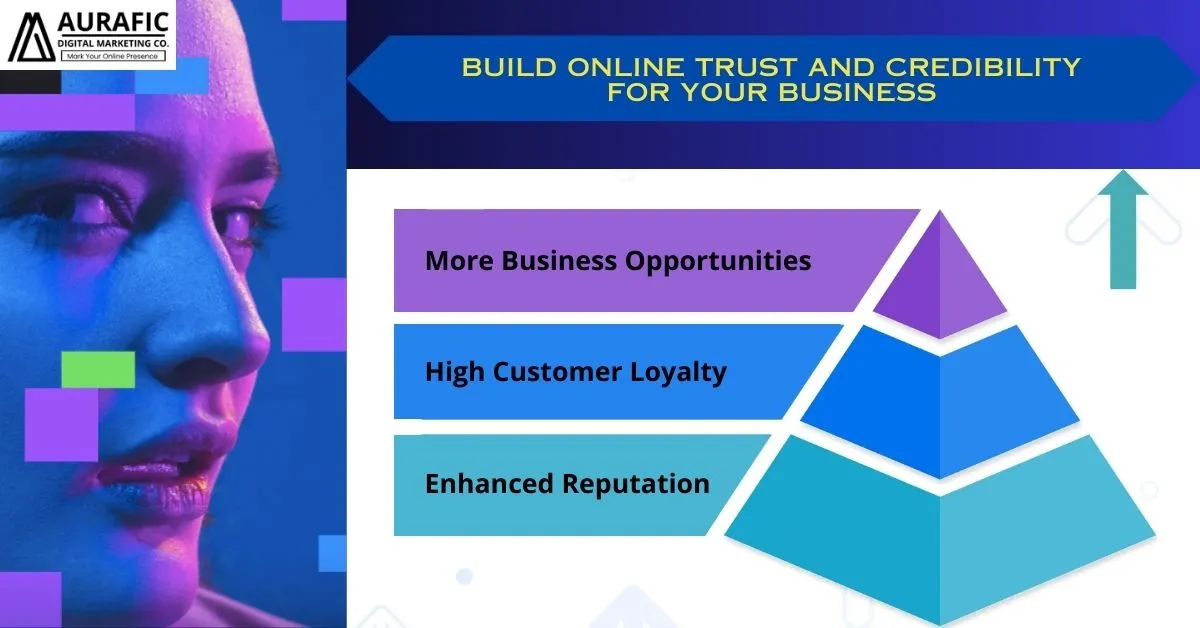In the dynamic world of online business, trust and credibility are the cornerstones of success. Consumers today are more discerning than ever, relying on digital signals to evaluate the authenticity and reliability of businesses. Establishing and maintaining trust is not only a competitive advantage but also a prerequisite for sustainable growth.
In this blog post, we’ll delve into expert tips on how to build online trust and credibility for your business.
1. Craft a Professional and User-Friendly Website
Your website serves as the virtual storefront for your business, making its first impression crucial. Design a professional and visually appealing website that reflects your brand identity. Ensure easy navigation, fast loading times, and mobile responsiveness. Display clear and accurate contact information, including a physical address and phone number to instil confidence in visitors.
If you want to build a business website for your own business or for your client, you may consider joining the online web designing course.
2. Prioritize Security for Online Transactions
3. Provide Transparent and Honest Communication
Transparency builds trust. Be candid and upfront about your products, services, and business practices. Clearly communicate pricing, policies, and terms and conditions. If there are any changes or updates you do on your website or in your policies or business practice, then communicate them promptly to foster an open and honest relationship with your audience.
By doing so, you infuse trust for your brand in the mind of your customers and assure them about your transparent approach in market dealing. This is the best way to build a long lasting relationship with customer.
4. Showcase Customer Testimonials, Reviews and Feedbacks
Positive customer testimonials and reviews are powerful tools for building credibility. Showcase these testimonials prominently on your website. Encourage satisfied customers to leave reviews on third-party review sites and social media. Respond to both positive and negative reviews with professionalism and a commitment to addressing any concerns.
5. Cultivate a Strong Social Media Presence
Social media is a direct channel for engaging with your audience and building trust. Maintain a consistent and professional presence on platforms relevant to your target audience. Share valuable content, respond to comments, and actively participate in conversations. Social media is not just a broadcasting tool but a platform for genuine people engagement.
6. Invest in Quality Content Marketing
Content marketing is a strategic approach to demonstrate expertise and provide value to your audience. Develop a content marketing strategy that includes blog posts, articles, videos, and infographics. Address common pain points and questions within your industry, positioning your business as a knowledgeable and reliable resource.
7. Optimize Google Business Listing
8. Secure and Update Your Website Regularly
A secure and up-to-date website is a trust signal for visitors. Regularly update your website’s software, plugins, and security features to protect against vulnerabilities. Use HTTPS to secure data transmission, assuring users that their information is safe.
9. Cultivate Consistent Branding Across Platforms
Consistent branding builds recognition and trust. Maintain uniform branding across all online platforms, including your website, social media, and marketing materials. Consistency reinforces your brand identity and fosters trust among your audience.
10. Display Trust Seals and Certifications
Highlight trust seals, certifications, and awards on your website. These symbols of recognition from reputable organizations provide reassurance to visitors. Clearly communicate any affiliations, partnerships, or memberships in industry organizations to enhance your credibility.
11. Offer Customer Guarantees and Clear Policies
Clearly outline customer guarantees, return policies, and warranty information on your website. Transparent and customer-friendly policies contribute to building trust. When customers know what to expect, they are more likely to trust your business.
12. Engage in Community Involvement and Social Responsibility
Demonstrate your commitment to making a positive impact by engaging in community initiatives or social responsibility efforts. Share your involvement on your website and social media to showcase your business’s dedication to ethical practices and community well-being.
13. Provide Consistent and Timely Updates
Keep your audience informed about any changes or improvements to your products or services. Regular updates signal that your business is dynamic and committed to providing the best experience for customers. Consistency and transparency contribute to long-term trust.
Conclusion
Building online trust and credibility is an ongoing process that requires dedication and a customer-centric approach. By implementing these expert tips, your business can create a trustworthy and credible online presence, fostering strong relationships with your audience and positioning your brand for sustained success.
Expert Tip:
If you want to take your business online, then don’t miss out on including the ORM (online reputation management) strategy in your marketing plan. People most often forget to implement ORM with their online campaigns and ultimately suffer due to their inefficient plan on the online reputation of their businesses.
Once the audience starts considering any business as bogus or fraud, then it takes no time for that business to close down.
Want to learn more about the ways through which the reputation of any business can be saved or kept intact then you need to learn different strategies that are followed to build online trust and prevent negative criticism by the customer.
At Aurafic Academy, PDMC is one such course in which you get to learn in detail about online reputation management and different strategies associated with it. Request for a free demo today.




